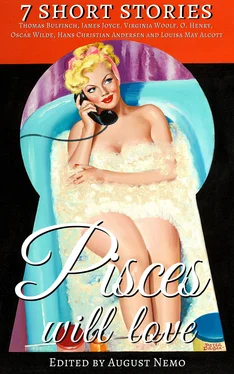Thus Psyche became at last united to Cupid, and in due time they had a daughter born to them whose name was Pleasure.
The fable of Cupid and Psyche is usually considered allegorical. The Greek name for a butterfly is Psyche, and the same word means the soul. There is no illustration of the immortality of the soul so striking and beautiful as the butterfly, bursting on brilliant wings from the tomb in which it has lain, after a dull, grovelling, caterpillar existence, to flutter in the blaze of day and feed on the most fragrant and delicate productions of the spring. Psyche, then, is the human soul, which is purified by sufferings and misfortunes, and is thus prepared for the enjoyment of true and pure happiness.
In works of art Psyche is represented as a maiden with the wings of a butterfly, along with Cupid, in the different situations described in the allegory.
Milton alludes to the story of Cupid and Psyche in the conclusion of his “Comus”:
“Celestial Cupid, her famed son, advanced,
Holds his dear Psyche sweet entranced,
After her wandering labours long,
Till free consent the gods among
Make her his eternal bride;
And from her fair unspotted side
Two blissful twins are to be born,
Youth and Joy; so Jove hath sworn.”
The allegory of the story of Cupid and Psyche is well presented in the beautiful lines of T. K. Harvey:
“They wove bright fables in the days of old,
When reason borrowed fancy’s painted wings;
When truth’s clear river flowed o’er sands of gold,
And told in song its high and mystic things!
And such the sweet and solemn tale of her
The pilgrim heart, to whom a dream was given,
That led her through the world,- Love’s worshipper,-
To seek on earth for him whose home was heaven!
“In the full city,- by the haunted fount,-
Through the dim grotto’s tracery of spars,-
‘Mid the pine temples, on the moonlit mount,
Where silence sits to listen to the stars;
In the deep glade where dwells the brooding dove,
The painted valley, and the scented air,
She heard far echoes of the voice of Love,
And found his footsteps’ traces everywhere.
“But nevermore they met! since doubts and fears,
Those phantom shapes that haunt and blight the earth,
Had come ‘twixt her, a child of sin and tears,
And that bright spirit of immortal birth;
Until her pining soul and weeping eyes
Had learned to seek him only in the skies;
Till wings unto the weary heart were given,
And she became Love’s angel bride in heaven!”
The story of Cupid and Psyche first appears in the works of Apuleius, a writer of the second century of our era. It is therefore of much more recent date than most of the legends of the Age of Fable. It is this that Keats alludes to in his “Ode to Psyche”:
“O latest born and loveliest vision far
Of all Olympus’ faded hierarchy!
Fairer than Phoebe’s sapphire-regioned star
Or Vesper, amorous glow-worm of the sky;
Fairer than these, though temple thou hast none,
Nor altar heaped with flowers;
Nor virgin choir to make delicious moan
Upon the midnight hours;
No voice, no lute, no pipe, no incense sweet,
From chain-swung censer teeming;
No shrine, no grove, no oracle, no heat
Of pale-mouthed prophet dreaming.”
In Moore’s “Summer Fete” a fancy ball is described, in which one of the characters personated is Psyche —
“ . . . not in dark disguise to-night
Hath our young heroine veiled her light;-
For see, she walks the earth, Love’s own.
His wedded bride, by holiest vow
Pledged in Olympus, and made known
To mortals by the type which now
Hangs glittering on her snowy brow,
That butterfly, mysterious trinket,
Which means the soul, (though few would think it,)
And sparkling thus on brow so white
Tells us we’ve Psyche here to-night.”
by O. Henry
––––––––

It was a day in March.
Never, never begin a story this way when you write one. No opening could possibly be worse. It is unimaginative, flat, dry and likely to consist of mere wind. But in this instance it is allowable. For the following paragraph, which should have inaugurated the narrative, is too wildly extravagant and preposterous to be flaunted in the face of the reader without preparation.
Sarah was crying over her bill of fare.
Think of a New York girl shedding tears on the menu card!
To account for this you will be allowed to guess that the lobsters were all out, or that she had sworn ice-cream off during Lent, or that she had ordered onions, or that she had just come from a Hackett matinee. And then, all these theories being wrong, you will please let the story proceed.
The gentleman who announced that the world was an oyster which he with his sword would open made a larger hit than he deserved. It is not difficult to open an oyster with a sword. But did you ever notice any one try to open the terrestrial bivalve with a typewriter? Like to wait for a dozen raw opened that way?
Sarah had managed to pry apart the shells with her unhandy weapon far enough to nibble a wee bit at the cold and clammy world within. She knew no more shorthand than if she had been a graduate in stenography just let slip upon the world by a business college. So, not being able to stenog, she could not enter that bright galaxy of office talent. She was a free-lance typewriter and canvassed for odd jobs of copying.
The most brilliant and crowning feat of Sarah’s battle with the world was the deal she made with Schulenberg’s Home Restaurant. The restaurant was next door to the old red brick in which she ball-roomed. One evening after dining at Schulenberg’s 40-cent, five-course table d’hôte(served as fast as you throw the five baseballs at the coloured gentleman’s head) Sarah took away with her the bill of fare. It was written in an almost unreadable script neither English nor German, and so arranged that if you were not careful you began with a toothpick and rice pudding and ended with soup and the day of the week.
The next day Sarah showed Schulenberg a neat card on which the menu was beautifully typewritten with the viands temptingly marshalled under their right and proper heads from “hors d’oeuvre” to “not responsible for overcoats and umbrellas.”
Schulenberg became a naturalised citizen on the spot. Before Sarah left him she had him willingly committed to an agreement. She was to furnish typewritten bills of fare for the twenty-one tables in the restaurant—a new bill for each day’s dinner, and new ones for breakfast and lunch as often as changes occurred in the food or as neatness required.
In return for this Schulenberg was to send three meals per diem to Sarah’s hall room by a waiter—an obsequious one if possible—and furnish her each afternoon with a pencil draft of what Fate had in store for Schulenberg’s customers on the morrow.
Mutual satisfaction resulted from the agreement. Schulenberg’s patrons now knew what the food they ate was called even if its nature sometimes puzzled them. And Sarah had food during a cold, dull winter, which was the main thing with her.
And then the almanac lied, and said that spring had come. Spring comes when it comes. The frozen snows of January still lay like adamant in the crosstown streets. The hand-organs still played “In the Good Old Summertime,” with their December vivacity and expression. Men began to make thirty-day notes to buy Easter dresses. Janitors shut off steam. And when these things happen one may know that the city is still in the clutches of winter.
Читать дальше














